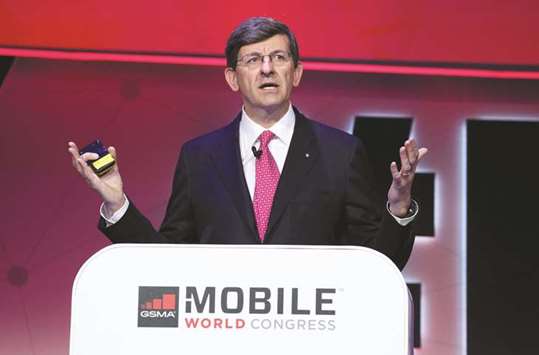Vodafone chief executive Vittorio Colao will step down in October after 10 years in which the Italian reshaped the world’s second largest mobile operator into a digital communications powerhouse with a string of major deals.
The urbane Colao will be replaced by Nick Read, finance director since 2014, whose broad international experience had marked him out as the likely next leader of a group with 536mn mobile customers and €47bn ($56bn) in revenue.
He will take charge of a group that, under Colao, pulled back from its once brazen expansionist drive, most notably when it sold out of the United States with a $130bn exit from a joint venture with Verizon.
Last week Vodafone struck a $21.8bn deal to buy Liberty Global’s cable TV and broadband networks in Germany and other markets to strengthen its business in Europe, where 35% of its proforma revenue came from fixed line last year.
And in India, which it entered with great fanfare in 2007, it is merging its operations with Idea Cellular to bulk up in a market that has been hit by intense competition.
“The chapter that Vodafone is now starting to write is completely new,” Colao told reporters. “It is the right time...to start with a new dedicated management team.”
Read, a Briton, will be replaced by his deputy since 2015, Margherita Della Valle, an Italian who joined the group in 1994.
Analysts said the timing of the departure should come as no surprise and that investors should be reassured by Read’s appointment due to his experience running its British operations and the emerging market assets.
The change came as the group published solid 2018 results and a more cautious 2019 outlook due to price cuts in Spain and an expected increase in competition in Italy.
Its shares fell 3.5%. “With the Liberty deal announced and India set to close, he leaves behind a strategically well-positioned portfolio for his successor Nick Read, who we think is a safe pair of hands,” analysts at Bernstein said. In Read, 53, investors will get a chief executive groomed for the job. Read said he had been alongside Colao through the process of reshaping Vodafone, and he would now deliver the benefits for shareholders and customers.
“I think now is the time to really focus on our organic plan, really focusing on digital transformation of our business and the customer experience,” he told reporters.
“And of course there’s a big opportunity of integrating these new businesses, both Liberty and over in India.”
Having joined Vodafone in 2001, Read’s roles have included running the British and emerging market operations.
He has also sat on the boards of the company’s listed operations in Africa and Qatar, its subsidiaries in India and Egypt and its joint venture in Australia.
One area that remains to be tackled is Britain, Vodafone’s home market where it languishes in third place behind BT’s EE and Telefonica’s O2.
Annual organic service revenue there fell 3.5%, compared with growth in the rest of Europe.
The management changes were announced as the company reported a 1.4% rise in organic service revenue for its fourth quarter, beating analyst forecasts of a 1.1% rise.
Full year core earnings rose 11.8% to €14.7bn, beating guidance for “around 10%” organic growth and just ahead of analyst forecasts of €14.6bn.
For 2019, the group struck a more cautious tone with a forecast of organic core earnings growth of between 1 and 5%, and free cash flow before spectrum costs of at least €5.2bn, slightly down on the 2018 number of €5.4bn.
Chairman Gerard Kleisterlee said Colao had been an “exemplary leader and strategic visionary who has overseen a dramatic transformation of Vodafone”.
Born in northern Italy, Colao cut his teeth as a management consultant at McKinsey before in 1996 he joined Omnitel Pronto Italia, which later became Vodafone Italy.
A keen cyclist, the tall Colao has lived a quiet life in London, largely avoiding London’s corporate social scene.
Colleagues say he enjoys the cut and thrust of talking to journalists and analysts, and will also happily discuss European politics and regulation.
Analysts have speculated that he could move into Italian politics. His departure follows that of Martin Sorrell at WPP after 33 years in charge, meaning the FTSE 100 has lost two of its longest-serving CEOs in a short period of time.
“It has a been a real privilege to lead the group through a decade of massive strategic transformation culminating in today’s good financial performance,” Colao told reporters. “But it is not yet the time for goodbyes.”

Colao: On the way out.
